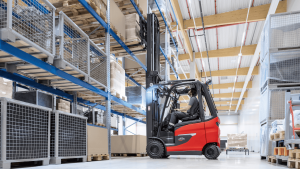You’ve seen them bustling around warehouses, effortlessly lifting heavy loads and streamlining operations. But did you know that the forklift industry in Singapore is experiencing rapid growth? The demand for forklifts is skyrocketing, driven by the expanding e-commerce sector and a surge in technological advancements. In this article, we’ll delve into the factors behind this growth and explore the impact it has on the logistics sector. Get ready to uncover the data-driven insights that shed light on the thriving forklift industry in Singapore.

Increasing Demand for Forklifts
In recent years, you’ve seen a significant rise in the demand for forklifts in Singapore. This increase in demand can be attributed to several factors. Firstly, Singapore’s thriving logistics and warehousing industry has fueled the need for efficient material handling equipment. Forklifts, being versatile and capable of lifting heavy loads, have become an indispensable tool in these industries. Secondly, the growth of e-commerce and online shopping has led to an exponential increase in the volume of goods being transported and stored. Forklifts play a crucial role in ensuring smooth operations and timely delivery of goods. Lastly, the government’s emphasis on enhancing productivity and efficiency in various sectors has prompted businesses to invest in forklifts as a means of streamlining their operations and reducing manual labor. As a result, the demand for forklifts is expected to continue its upward trajectory in the coming years.
Technological Advancements in Forklifts
Experience the evolution of forklift technology in Singapore as advanced features and capabilities revolutionize material handling operations. Technological advancements in forklifts have significantly improved efficiency, productivity, and safety in the industry. One key advancement is the integration of sensors and cameras, enabling forklift operators to have a better view of their surroundings and avoid accidents. Additionally, the development of electric forklifts has gained traction, offering benefits such as reduced noise levels and zero emissions, while also being cost-effective in the long run. Furthermore, the use of automation and artificial intelligence has allowed forklifts to operate autonomously, optimizing workflow and reducing human error. These advancements have not only increased the efficiency of material handling operations but have also contributed to a safer and more sustainable working environment in Singapore’s forklift industry.
Growing E-commerce Industry in Singapore
With the growing e-commerce industry in Singapore, you can expect an increased demand for forklifts to efficiently handle and transport goods. The rise in online shopping has led to a surge in warehouse operations and logistics activities. According to a report by Statista, the e-commerce market in Singapore is projected to reach a value of US$5.4 billion by 2025. This rapid growth is driven by factors such as increasing internet penetration, rising smartphone usage, and changing consumer preferences. As more businesses shift towards online platforms, the need for efficient material handling equipment like forklifts becomes crucial. Forklifts play a vital role in streamlining operations, reducing manual labor, and ensuring fast and accurate order fulfillment. Consequently, the forklift industry in Singapore is expected to expand significantly in response to the booming e-commerce sector.
Impact on the Logistics Sector
You will experience a significant impact on the logistics sector due to the growth of the forklift industry in Singapore. This growth has led to several positive changes in the logistics sector, improving efficiency and productivity. With the increasing demand for forklifts in warehouses and distribution centers, companies can now handle larger volumes of goods and materials more effectively. Forklifts are essential for loading and unloading trucks, stacking and organizing products, and transporting heavy items. By incorporating forklifts into their operations, logistics companies can streamline their processes, reduce manual labor, and minimize the risk of accidents and injuries. This growth in the forklift industry has also created job opportunities, as more workers are needed to operate and maintain these machines. Overall, the growth of the forklift industry has revolutionized the logistics sector in Singapore, making it more efficient, productive, and safe.
